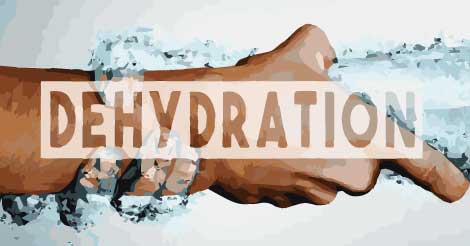Dehydration Causes, Symptoms & Prevention
Dehydration is a typical summer illness. Hot and humid weather leads to dehydration in the body due to several reasons. Dehydration occurs when there is a mismatch and the amount of water leaving the body is higher than the amount being taken in.

Causes of Dehydration
Summer is not the only culprit for this condition but definitely the biggest risk season. The mismatch in the amount of water inside the body can happen because of several reasons
Diarrhoea:
This is the commonest reason when a person loses excess water. Frequent, watery stools lead to heavy water loss from the body. Summer time is host to several bacterial and viral infections causing loose stools.
Vomiting:
Another huge water drain out from the body is by vomiting which are usually accompanied by loose stools as a result of any infection.
Sweating:
Sometimes excessive sweating can lead to dipped water content in the body. Extreme physical activity in hot weather signals the body to produce more sweat in order to keep it cool but it also can cause dehydration if water is not replenished along with.
Signs of Dehydration
Dehydration becomes quite evident. You may begin to feel the following:
- Dry tongue & mouth
- Flushing of skin
- Fatigue, extreme tiredness
- Loss of appetite
- Intolerance towards heat
- Light-headedness
- Excessive thirst
- Urine turning dark
How to Avoid Dehydration
The ideal way to avoid dehydration is to drink fluids before getting thirsty. Thirst is usually a late sign dehydrated and should not be waited for.
To avoid dehydration in summer, people who are planning for heavy physical activity outdoors should drink minimum 1.5 litres of water 2 hours before the activity. After the activity, they should again consume enough fluids.
If diarrhoea and vomiting are observed, immediate check is needed. Fluid replacement may be needed, oral or through IV line.
Dehydration Prevention & Tips
Dehydration can be prevented by observing some measures
- Avoid heavy, strenuous workouts in hot climate
- Keep drinking water and other fluids at regular intervals
- Diarrhoea and vomiting should be kept under check
- Fluid replacement should be done, if loose stools become frequent
- Avoid high salt & high protein diet food
Fluids to Drink and Avoid
Not all beverages are good and are considered an ideal fluid replacement to combat dehydration.
What to Drink -
- Fresh juices, lemonade
- Electrolyte based rehydration drinks/powders
- Sports drinks
What to Avoid -
- Tea, coffee & other caffeinated drinks
- Alcohol
- Aerated drinks, soda






